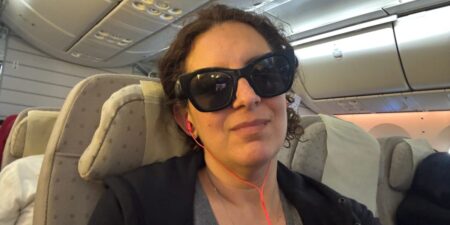Growing up, Sarah Nagle recalled constantly hearing that homeschooled kids will fail once they enter the real world.
Speaking from experience, Nagle can confirm that’s not the case.
“My parents did pretty well preparing me academically for college,” Nagle told Business Insider. “And I have to say I never found college particularly challenging in any way. I’m not even sure I found it socially challenging.”
Nagle was homeschooled by both of her parents in California from the age of 10 through college. Now self-employed in jewelry design, the Gen Xer said she’s grateful for her homeschool experience because her parents tailored her lessons to meet her learning pace and interests, and she said the personalized curriculum led her to excel in national testing.
In addition, her parents didn’t push for an elite college as a step to success later in life, which empowered Nagle to attend the University of Texas at Austin on a scholarship in the late 90s before transferring to San Francisco State University instead of taking out student loans to pursue a more prestigious school. She said the lack of student debt is a defining characteristic that separates her from many of her peers, and she’s grateful that she didn’t have the pressure that students at public schools often face to attend more expensive colleges.
“My parents always told me that you shouldn’t make college the be-all and end-all of your life,” Nagle said. “I realize my life is really different from a lot of my friends who went to their dream school and have just still tons of student loan debt.”
Nagle’s jewelry business has generated nearly $29,000 in sales in September and just over $115,500 year-to-date, according to documents reviewed by Business Insider. She made $121,000 in sales the year prior. She said that hers can be an “erratic business” and that her sales fluctuate, with August, September, and March typically being her busiest months. She says she prioritizes reinvesting in her business — like buying new equipment — over paying herself. As a result, she said, her annual income is in the high five figures.
Homeschooling in the US is on the rise. During the pandemic, the number of parents choosing to teach their kids at home surged due to dissatisfaction with remote learning, and that trend never went away.
The growth in the school voucher movement and the increased availability of federal funds to use for education other than public school, like homeschools or microschools, are contributing to the increased interest in alternative forms of schooling. Still, public school enrollment remains dominant; 49.5 million students were enrolled in public schools for the fall of 2023, compared to the approximately 3 million who were homeschooled that same year.
Prior to being homeschooled, Nagle said she attended a public school briefly, but her parents were dissatisfied with the quality of the local schools. She said it was difficult to hear criticism of homeschooling and the notion that kids like herself wouldn’t have the skills to succeed socially or academically, but looking back, she’s glad she’s able to prove those critics wrong.
“It made me really think things through,” Nagle said, “and realize that sometimes, even though everybody’s saying one thing, they can all be wrong.”
‘It’s not a fringe decision anymore’
Data compiled by Johns Hopkins’ Homeschool Research Lab found that 17 states have so far reported increases in homeschooling in the 2024-25 school year. It follows 19 states that reported homeschooling increases in the year prior.
Angela Watson, creator of the research lab and senior research fellow at the Johns Hopkins Institute for Education Policy, previously told Business Insider that “now we see that people who choose to homeschool their children are slightly younger than their private school or public schooling parent peers.”
“And so it could be that this is kind of a younger generation thing where it’s not stigmatized for them in the same way,” Watson said.
Some states do not report homeschooling data, and since each state has different homeschooling laws — including whether parents can receive federal dollars to homeschool — it can be difficult to regulate. Even so, Nagle said, the rise in homeschooling among the states that do report shows that it’s a type of education that’s become more accepted in the US, and less stigmatized.
“It’s a minority decision, but it’s not a fringe decision anymore,” Nagle said. She acknowledged that the social components of homeschool were challenging; she said she was nervous to go to college and felt unprepared to make the transition into a traditional school environment.
Once she settled into college life, though, she found she didn’t have the social shortcomings that she expected. Had she not been homeschooled, she doesn’t think she would have had the confidence or financial means to step out of the traditional mold and pursue self-employment.
“My homeschool experience really gave me the confidence to go my own way,” Nagle said. “I think it really gave me a better focus on life.”
Read the full article here
















